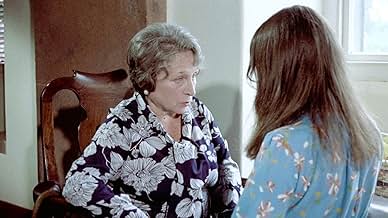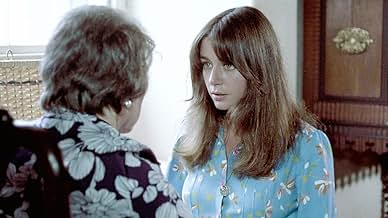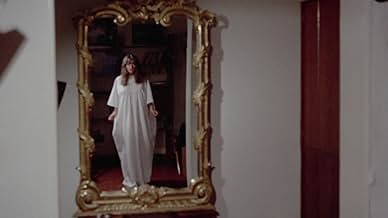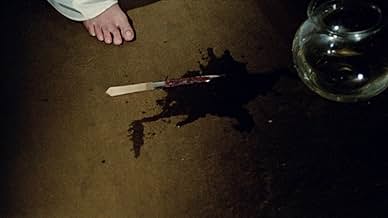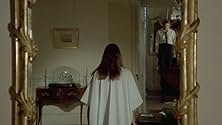अपनी भाषा में प्लॉट जोड़ेंA nightclub singer is haunted by the ghost of her late father. The dead man summons her through a mirror, forcing her to commit a series of violent crimes.A nightclub singer is haunted by the ghost of her late father. The dead man summons her through a mirror, forcing her to commit a series of violent crimes.A nightclub singer is haunted by the ghost of her late father. The dead man summons her through a mirror, forcing her to commit a series of violent crimes.
- पुरस्कार
- कुल 1 जीत
Robert Woods
- Bill
- (as Robert Wood)
Françoise Brion
- Carla
- (as Francoise Brion)
Alice Arno
- Tina
- (as Alice Arnó)
María Bassó
- Elvira
- (as Maria Bassó)
Ada Tauler
- Stefania
- (as Adela Tauler)
Chantal Broquet
- Angela
- (बिना क्रेडिट के)
Carmen Carbonell
- Tante
- (बिना क्रेडिट के)
Jesús Franco
- Roger
- (बिना क्रेडिट के)
Nicole Guettard
- Gloria
- (बिना क्रेडिट के)
Monica Swinn
- Marie's Girlfriend (French version only)
- (बिना क्रेडिट के)
फ़ीचर्ड समीक्षाएं
Obscene Mirror (1973)
*** (out of 4)
This is a pretty well, if highly praised, film from the Spanish director, which is (apparently) available in three different versions. The version getting all the love and praise is the Spanish version while the French and Italian versions are re-edited with hardcore scenes and an alternate cast added to the mix. The version I watched was the Italian one, which is hard to review due to the hardcore scenes, which were added. The basic plot, I believe, is the same from each version and centers on a woman (Emma Cohen) who suffers a breakdown after the suicide of her sister (played by Lina Romay in this version). Soon after the suicide the sister begins to see her dead sister inside a mirror, which causes her to go out, bring men home and kill them. Again, it's really hard to judge this film due to the added scenes and the fact that the Spanish version is apparently totally different but there was enough here to I loved to recommend people seeing this but at the same time you should certainly try and get the original version (which I will be looking for). The film reminded me a lot of Franco's Venus in Furs, which is among the director's best films. There's a deeply haunting, sad and tragic nature and atmosphere, which runs throughout this film and it wasn't hard to get caught up into the mental state of the main character. Franco's direction is very sharp throughout but most of the credit has to go towards Cohen who is simply terrific in the film. She doesn't have to resort to nudity or cheap thrills to get her performance across. I guess the best way to explain it is that she comes across like a spirit and just floats from one scene to the next, slowing breaking down in front of our eyes. Sadly the disc I watched also didn't feature any subtitles so I couldn't follow any of the dialogue, which there was plenty of and I'm sure if I could follow the story more I would have loved it even more. The hardcore scenes, which again, were added, are pretty ugly and add absolutely nothing to the movie. These scenes really killed everything that was going on so I found myself hitting the FF button through them. I'm hoping to track down the director's cut soon since most fans think this Italian version is a complete mess. If it is a mess and I enjoyed it this much then I can't wait to see what the Spanish one offers.
*** (out of 4)
This is a pretty well, if highly praised, film from the Spanish director, which is (apparently) available in three different versions. The version getting all the love and praise is the Spanish version while the French and Italian versions are re-edited with hardcore scenes and an alternate cast added to the mix. The version I watched was the Italian one, which is hard to review due to the hardcore scenes, which were added. The basic plot, I believe, is the same from each version and centers on a woman (Emma Cohen) who suffers a breakdown after the suicide of her sister (played by Lina Romay in this version). Soon after the suicide the sister begins to see her dead sister inside a mirror, which causes her to go out, bring men home and kill them. Again, it's really hard to judge this film due to the added scenes and the fact that the Spanish version is apparently totally different but there was enough here to I loved to recommend people seeing this but at the same time you should certainly try and get the original version (which I will be looking for). The film reminded me a lot of Franco's Venus in Furs, which is among the director's best films. There's a deeply haunting, sad and tragic nature and atmosphere, which runs throughout this film and it wasn't hard to get caught up into the mental state of the main character. Franco's direction is very sharp throughout but most of the credit has to go towards Cohen who is simply terrific in the film. She doesn't have to resort to nudity or cheap thrills to get her performance across. I guess the best way to explain it is that she comes across like a spirit and just floats from one scene to the next, slowing breaking down in front of our eyes. Sadly the disc I watched also didn't feature any subtitles so I couldn't follow any of the dialogue, which there was plenty of and I'm sure if I could follow the story more I would have loved it even more. The hardcore scenes, which again, were added, are pretty ugly and add absolutely nothing to the movie. These scenes really killed everything that was going on so I found myself hitting the FF button through them. I'm hoping to track down the director's cut soon since most fans think this Italian version is a complete mess. If it is a mess and I enjoyed it this much then I can't wait to see what the Spanish one offers.
Here is another of those elusive Franco films that in its proper context is neither horror, nor porn or sexploitation, in spite of the hardcore inserts, but wandering around urges.
Now I appreciate Franco in the way you do with a friend or co-worker you have known forever. I appreciate him, in part, because of how familiar his flaws and habits. So I won't mollycoddle him or pretend in his face: he was often sloppy, charmless as a thinker and embarrassing in a number of ways. Whereas some fans read profundity in this film, for me all the stuff about mirrors, madness and theater as staged inner life are as sophomoric as it gets, for instance that whispers of a damaged mind will issue from a mirror.
Let me say here that it's not the elements themselves, which others like Rivette, Resnais and Ruiz have used to similar effect, but the narrative distance they are placed away from the viewer, distance that leads up to them and away from.
But I accept it as part of the experience of shared intuition that is possible with a good friend; Franco is worth knowing because, going past conscious narrative impositions, I can relax in a fluid fabric of images which he seems to spontaneously stir up from life as he walks through it. The more of his films I watch, the more I relax because I have shared in previous travels.
It's all in the last scene here.
Leading up to it we have obviously layered madness about a woman reliving guilt from her past, inserts of incestual cunnilingus and hardcore sex (in the Italian version I saw), and relaxed wandering around bars and later exotic Madeira. As a whole the film evokes Franco's films with Soledad, She Killed in Ecstasy and Eugenie. It is not as 'pure' as Female Vampire, nor on the other hand as testing.
The idea, tremendously simple, is that a woman wanted to get married, but her beloved sister killed herself out of desperation and perhaps spurned love, and she carries this burden in unfulfilled affairs with men.
The Spanish version without the inserts may flesh out the story a bit more, but story is not the main point, it's swimming across to where images acquire life of their own.
In the last scene we have all this, the wandering, madness, and repressed emotion, coalesce together in a beautiful way as a bridal veil fluttering in the wind.
Now I appreciate Franco in the way you do with a friend or co-worker you have known forever. I appreciate him, in part, because of how familiar his flaws and habits. So I won't mollycoddle him or pretend in his face: he was often sloppy, charmless as a thinker and embarrassing in a number of ways. Whereas some fans read profundity in this film, for me all the stuff about mirrors, madness and theater as staged inner life are as sophomoric as it gets, for instance that whispers of a damaged mind will issue from a mirror.
Let me say here that it's not the elements themselves, which others like Rivette, Resnais and Ruiz have used to similar effect, but the narrative distance they are placed away from the viewer, distance that leads up to them and away from.
But I accept it as part of the experience of shared intuition that is possible with a good friend; Franco is worth knowing because, going past conscious narrative impositions, I can relax in a fluid fabric of images which he seems to spontaneously stir up from life as he walks through it. The more of his films I watch, the more I relax because I have shared in previous travels.
It's all in the last scene here.
Leading up to it we have obviously layered madness about a woman reliving guilt from her past, inserts of incestual cunnilingus and hardcore sex (in the Italian version I saw), and relaxed wandering around bars and later exotic Madeira. As a whole the film evokes Franco's films with Soledad, She Killed in Ecstasy and Eugenie. It is not as 'pure' as Female Vampire, nor on the other hand as testing.
The idea, tremendously simple, is that a woman wanted to get married, but her beloved sister killed herself out of desperation and perhaps spurned love, and she carries this burden in unfulfilled affairs with men.
The Spanish version without the inserts may flesh out the story a bit more, but story is not the main point, it's swimming across to where images acquire life of their own.
In the last scene we have all this, the wandering, madness, and repressed emotion, coalesce together in a beautiful way as a bridal veil fluttering in the wind.
Ana (Emma Cohen) and her father (Howard Vernon) have always meant the world to each other but their idyllic life together shatters when the girl wants to get married and, going into his study to show him her wedding gown, she finds her dad dangling from the end of a rope. Devastated, Ana puts her piano skills to good use by running away to become a singer in a lounge band only to find the pain's inside. She's a beauty and men are interested but whenever Ana reciprocates, the image of her father's suicide appears to her in mirrors and she sees herself stabbing those men to death. Unfortunately, whenever that happens, she either hears or reads in the paper that the men really were murdered. Devastated again, Ana tries to commit suicide but her best friend intervenes and takes her to a beautiful island to rest and recuperate - the island where Ana and her father lived...
The Spanish version of this film is considered to be the "director's cut" and I don't know how personal the film was to Franco but I took it personally. There's a fairytale quality to this adult nightmare about guilt and the burdens of the past we all carry but since it sounds like an oxymoron to put "expertly realized" and Jess Franco in the same sentence, suffice it to say that THE OBSCENE MIRROR was downright hypnotic. So much so, I didn't mind the time it took to get where it was going -and it certainly took its time. There were too many non-essential musical interludes and the camera's meaningless meandering makes Franco the most frustrating director I've ever encountered. All the zoom-in, zoom-out, pan right, scan left would be OK if it meant something but doing that to a flower bed or a harbor? Not only that, he'd go in for a close-up on a patron in a nightclub audience and linger so long I felt the person was bound to become part of the story but, no, they were just extras. Credit must go not only to the screenplay but to the cinematographer because there were long stretches where the film didn't seem like it was being "directed" and was quite beautiful to contemplate. All I can say in defense of my 8/10 rating is "there's something about it".
The Spanish version of this film is considered to be the "director's cut" and I don't know how personal the film was to Franco but I took it personally. There's a fairytale quality to this adult nightmare about guilt and the burdens of the past we all carry but since it sounds like an oxymoron to put "expertly realized" and Jess Franco in the same sentence, suffice it to say that THE OBSCENE MIRROR was downright hypnotic. So much so, I didn't mind the time it took to get where it was going -and it certainly took its time. There were too many non-essential musical interludes and the camera's meaningless meandering makes Franco the most frustrating director I've ever encountered. All the zoom-in, zoom-out, pan right, scan left would be OK if it meant something but doing that to a flower bed or a harbor? Not only that, he'd go in for a close-up on a patron in a nightclub audience and linger so long I felt the person was bound to become part of the story but, no, they were just extras. Credit must go not only to the screenplay but to the cinematographer because there were long stretches where the film didn't seem like it was being "directed" and was quite beautiful to contemplate. All I can say in defense of my 8/10 rating is "there's something about it".
For years and years, I fanatically defended the work of writer/director Jess Franco, but with every film of his that I watch, I wonder why I ever bothered. Maybe I should accept the fact Franco only made a handful of influential and genuine exploitation classics ("The Awful Dr. Orloff", "The Diabolical Dr. Z", "Faceless"), whereas the vast majority of his excessively large repertoire is just utter garbage.
And yet, for a good 15-20 minutes, it really seemed as if "The Obscene Mirror" would become another Franco-winner! The first quarter is definitely promising, with the introduction of a widower (Franco-regular Howard Vernon) and his two beautiful daughters Annette and Marie. Annette is head over heels in love with archeology student Arthur, but Marie is so jealous of her sister's happiness that she commits suicide by ramming a sword in her stomach one day before the wedding. Following the tragedy, Annette is so confused that she abruptly calls off her wedding and starts a new life as piano player in a raunchy bar. From this moment on, Annette hears and sees her sister appearing in an antique mirror, and Marie's vengeful spirit commands her to brutally slaughter every man she's sexually attracted to.
At least, this is the plot of the version I watched, because - apparently - there also exists a version in which it's Annette's father who commits suicide and commands her to kill. Oh well, just another typical flick in Jess Franco's bizarre universe.
With the exception of the compelling first 15 minutes, "The Obscene Mirror" is a dreadfully boring and frustrating film. Franco reverts to his bad habit of inserting overlong (and very un-sexy) hardcore footage, which absolutely doesn't have any added value. During countless of times during the film, you'll find yourself staring at extreme close-ups of a vagina (probably Lina Romay's), and listening to the sounds of either monotonous moaning or jazzy musical tunes. I don't know which of the two was more irritating.
For some strange reason I will never comprehend, "The Obscene Mirror" - in whatever version - is regarded as one of Franco's finest films, and this also gets confirmed by most of the user-comments on this website. Maybe it's fanstastic if endless close-ups of female genitalia are your thing, but it seems to me there are more effective channels for that.
And yet, for a good 15-20 minutes, it really seemed as if "The Obscene Mirror" would become another Franco-winner! The first quarter is definitely promising, with the introduction of a widower (Franco-regular Howard Vernon) and his two beautiful daughters Annette and Marie. Annette is head over heels in love with archeology student Arthur, but Marie is so jealous of her sister's happiness that she commits suicide by ramming a sword in her stomach one day before the wedding. Following the tragedy, Annette is so confused that she abruptly calls off her wedding and starts a new life as piano player in a raunchy bar. From this moment on, Annette hears and sees her sister appearing in an antique mirror, and Marie's vengeful spirit commands her to brutally slaughter every man she's sexually attracted to.
At least, this is the plot of the version I watched, because - apparently - there also exists a version in which it's Annette's father who commits suicide and commands her to kill. Oh well, just another typical flick in Jess Franco's bizarre universe.
With the exception of the compelling first 15 minutes, "The Obscene Mirror" is a dreadfully boring and frustrating film. Franco reverts to his bad habit of inserting overlong (and very un-sexy) hardcore footage, which absolutely doesn't have any added value. During countless of times during the film, you'll find yourself staring at extreme close-ups of a vagina (probably Lina Romay's), and listening to the sounds of either monotonous moaning or jazzy musical tunes. I don't know which of the two was more irritating.
For some strange reason I will never comprehend, "The Obscene Mirror" - in whatever version - is regarded as one of Franco's finest films, and this also gets confirmed by most of the user-comments on this website. Maybe it's fanstastic if endless close-ups of female genitalia are your thing, but it seems to me there are more effective channels for that.
As most know, there are 3 versions of the film. The Spanish is considered to be the true director's cut. The French changes the plot and swaps actors, while an Italian print adds hardcore bits to the newly added sex scenes from the French version. While it is frequently cited that the material in the French and Italian films were shot later, this is not entirely true. The Lina Romay footage was lensed later, but there are 3 extended nude scenes with Emma Cohen that were from the initial shoot, and I believe Franco would want them in any 'director's cut' DVD that will hopefully appear. They can easily be edited back into the Spanish print ( I've made myself a copy for future viewings ). Are the nude scenes essential to the plot, well perhaps not. But knowing how Franco adores the female form, coupled with Cohen's beautiful presence....I'd strongly feel he wanted them in the Spanish cut but was prevented by the strict censorship of the Spain at the time.
क्या आपको पता है
- गूफ़In the end credits of the Spanish version, Françoise Brion is credited as Carla and Alice Arno is credited as Tina but in the film, it's the other way around.
- कनेक्शनReferenced in Franco Noir (2021)
टॉप पसंद
रेटिंग देने के लिए साइन-इन करें और वैयक्तिकृत सुझावों के लिए वॉचलिस्ट करें
- How long is The Other Side of the Mirror?Alexa द्वारा संचालित
विवरण
- चलने की अवधि1 घंटा 22 मिनट
- ध्वनि मिश्रण
- पक्ष अनुपात
- 1.85 : 1
इस पेज में योगदान दें
किसी बदलाव का सुझाव दें या अनुपलब्ध कॉन्टेंट जोड़ें


